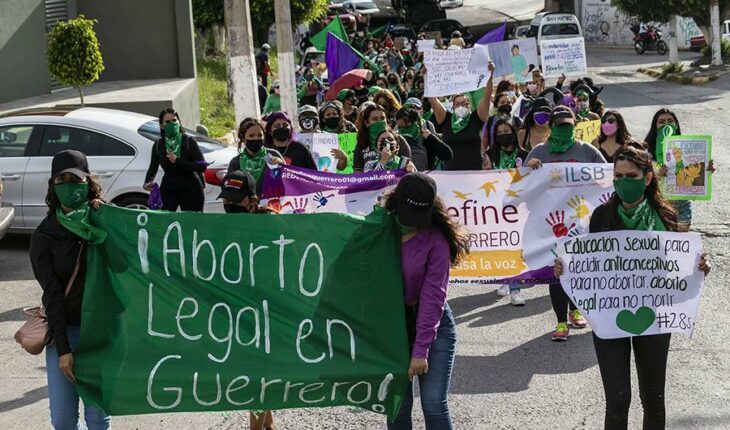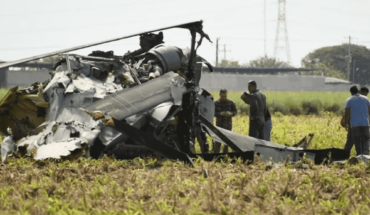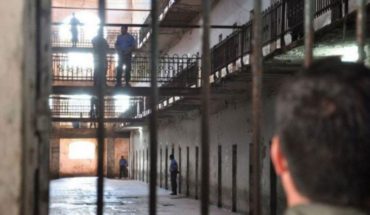We will name her Mary. She is a nine-year-old girl who on February 14 arrived with a family member at the general hospital of Chilpancingo, Raymundo Abarca Alarcón, to request the termination of pregnancy.
Maria was raped.
The request was made in accordance with article 159 of the State Criminal Code: with a criminal complaint for the crime of rape and with the express authorization of the Public Ministry for the interruption.
In the hospital they refused, even trying to convince her to continue the pregnancy. The case transcended the media and forced the Guerrero authorities to reconsider the refusal.
Three days later, in another hospital, that of the Mother and Child of Guerrerense, Maria’s pregnancy was terminated.
This is not the only case, in the hospitals of Guerrero there is constant resistance to terminate pregnancies as a result of rape.
Context: After demand, the Ministry of Health of Guerrero terminates pregnancy to girl me’ phaa victim of abuse
Viridiana Gutiérrez Sotelo, coordinator of the Citizen Observatory of Violence against Women of Guerrero and promoter of the second Alert of Gender Violence for comparative grievance, documented in 2021 at least eight cases in four hospitals where girls, adolescents and women who were raped refused to terminate their pregnancies.
Gutierrez Sotelo does the count. In July, a young me’phaa woman who was sexually raped to request termination of pregnancy arrived at the Chilpancingo hospital and was denied. He was given long until a doctor, on her own, gave him a pill.
Two months later, a pregnant 14-year-old girl arrived at the hospital in Iguala. She was raped and filed her complaint with the MP; however, municipal DIF staff convinced her to continue with the pregnancy.
In October, in Ayutla, a 17-year-old girl requested the termination of her pregnancy, after being raped by her boyfriend. In the hospital of that municipality she was denied the service and organizations defending women’s rights accompanied her to Mexico City to have an abortion.
That same month, a 13-year-old girl arrived at the Chilpancingo hospital after she was denied termination of pregnancy at a health center in the municipality of Juan R. Escudero. There was resistance and after days, due to pressure from organizations, they agreed to perform abortion.
In November, a 13-year-old girl who was raped by her half-brother arrived at the Taxco hospital with the complaint and authorization of the MP for the termination of pregnancy. They denied it. In the end they agreed, but sent her to a health center.
“They agreed because we intervened, but with a lot of violence. The director sent her to the health center to take the medication because she didn’t want it to stain her hospital,” recalls Gutiérrez Sotelo.
In December, a 30-year-old woman with a cognitive disability requested the termination of pregnancy at the hospital in Iguala. She was raped by a neighbor, a 70-year-old man. They denied it but due to the intervention of organizations they practiced abortion.
The resistance is not only from the health sector, but also in the MPs. Gutiérrez Sotelo recalls the case of a girl who at age 16 was raped by her brother’s friend in the municipality of Ometepec.
The girl decided to have an abortion and together with her parents and Viridiana, they attended the MP to denounce and obtain authorization for the termination of pregnancy.
The agent tried to convince her and then put up many obstacles, even offering to adopt the child if she decided to have him, then harassed her. He threatened to imprison her if she found out she was not raped. In the end he authorized the interruption but sent patrols to the young woman’s home until they performed the abortion.
Read: Indigenous minor jailed in Guerrero after fleeing to avoid forced marriage
In Guerrero, two Gender Violence Alerts have been declared, the second for comparative grievance, which orders the Criminal Code to be homologated with Rule 046 to guarantee that girls, adolescents and women victims of rape access the interruption of pregnancy without filing a criminal complaint and, less, having the authorization of an MP.
A month ago, in the local Congress, Morena deputies presented an initiative to decriminalize abortion. It is the third in the last decade.
As in the other two initiatives, there is resistance from deputies and religious groups to de-pandemic abortion, but there is also a demand for legislation.
Days after the new initiative, the National Institute of Women (Inmujeres) called on the Congress of Guerrero to amend the Criminal Code to decriminalize the termination of pregnancy during the first 12 weeks of gestation.
“On the issue of the legal interruption of pregnancy, the Mexican State has several observations from international organizations that have urged it to harmonize its legal framework at the national and subnational levels in accordance with the highest international standards of women’s human rights and to which Mexico has committed,” said Inmujeres.
Maria’s case brought the issue of decriminalizing abortion back to Congress and showed the level of debate. PRI deputy Julieta Fernández Márquez said:
“So we don’t know exactly what happened to this girl, but I think this story is unfortunately the case of many other girls who start their sexual and reproductive life at age 10 and who definitely because of rape or because they are used to it in customs and customs, to marry at a very young age or to get together at a very young age, and that they have more than seven children per woman.”
The first time Maria and her family requested the termination of pregnancy was at the basic community hospital of her town located in a bend of the Mountain of Guerrero, from where she was referred directly to Chilpancingo.
The hospital in his village barely has the essentials; it does not have the infrastructure or the specialized personnel to deal with a case like Maria’s: a nine-year-old girl, with weight loss and high risk.
That doesn’t just happen in Mary’s village. but throughout the Mountain, none of the seven basic hospitals, nor the general one in Tlapa, have the infrastructure, nor do they have specialized personnel.
In this region, it is not only about the permanent resistance of medical personnel to terminate pregnancy, the problem is structural: there are so many shortcomings that do not allow you to do it safely.
Neil Arias Vitinio is an attorney at the Centro de Derechos Humanos de la Montaña, Tlachinollan. It attends daily to girls, adolescents and women who suffer the various forms of violence to which they are subjected in the Mountains: forced marriages, sexual violations and the most extreme, femicide.
Arias Vitinio has accompanied several cases of girls and adolescents who were raped and who tried to terminate the pregnancy but ran into the shortcomings of hospitals, negligence in the MPs and suffocating impunity.
“The health authorities and the public ministries are not up to the task of dealing with these types of cases and the only thing that happens is that they put the lives of these girls at risk,” says Arias Vitinio.
These are four of the cases he has documented Arias Vitinio.
Two years ago, a 13-year-old girl from a village in Cochoapa El Grande was sexually raped by her brother-in-law, her sister’s husband. When the girl was five months pregnant she requested the termination.
For the time, it exceeded the 12 weeks set by the Criminal Code of the state to terminate the pregnancy but above all because of the risk, Tlachinollan asked for the intervention of the organization Catholics for the right to decide so that the interruption was practiced in Mexico City.
“That time it seemed to us that because of the risk that the girl ran, it was better to do it in Mexico City where there is more specialized care, here in the Mountain there is no way,” explains the lawyer.
Arias Vitinio was a direct witness of the resistance that also exists in the MP. About three years ago she accompanied two young people to file the complaint for rape and the authorization for the termination of pregnancy.
The first case was that of a young woman who was raped by the driver of a van while traveling to the municipality of Alcozauca. She was given the authorization a month later, that is, the pregnancy advanced four weeks.
Also: Decriminalization of abortion in Oaxaca: only two clinics and no care for indigenous women
When he arrived at the hospital there was resistance from the medical staff.
“They attended to her because we wrote explaining that there is Rule 046 to attend to women in these cases of rape,” she says.
In the end they accepted but they ran into the precarious condition of the hospitals of the Mountain: the young woman had to pay, in private clinics, the ultrasounds because they required her to give exactly the gestation time. Then they informed him that the interruption would be done by a general practitioner, because they did not have a gynecologist. Nor did he receive psychological or preventive care to avoid a sexually transmitted disease. Nothing.
Arias Vitinio also accompanied another woman who was raped while going to work in the fields in the municipality of Atlixtac. He filed the criminal complaint but the MP took two months to authorize the termination of the pregnancy.
“In this case the woman decided to continue with the pregnancy.zo, when they gave him the authorization he had already passed the deadline and had already spent a lot on so much return, “says the lawyer.
Arias Vitinio documented another case: in 2020 in a village in Acatepec a 12-year-old girl was sexually raped by a 42-year-old man. It was his neighbor. The family found out until the pregnancy was evident: she was five months old.
The neighbor threatened the girl, warned her that if she said something she would murder her mom and dad. The girl was silent until her belly allowed it.
This man, who was a municipal public official at the time, was criminally reported by the family for the rape. In that case nothing has happened: the aggressor is free and the girl, now 14 years old, is a mother.
“The family was informed about the termination of the pregnancy, but they did not want to, they told us that they could not do it because of their beliefs: ‘we are poor but we will be able to move it forward,'” she explains.
What we do at Animal Político requires professional journalists, teamwork, dialogue with readers and something very important: independence. You can help us keep going. Be part of the team.
Subscribe to Animal Político, receive benefits and support free journalism.#YoSoyAnimal





